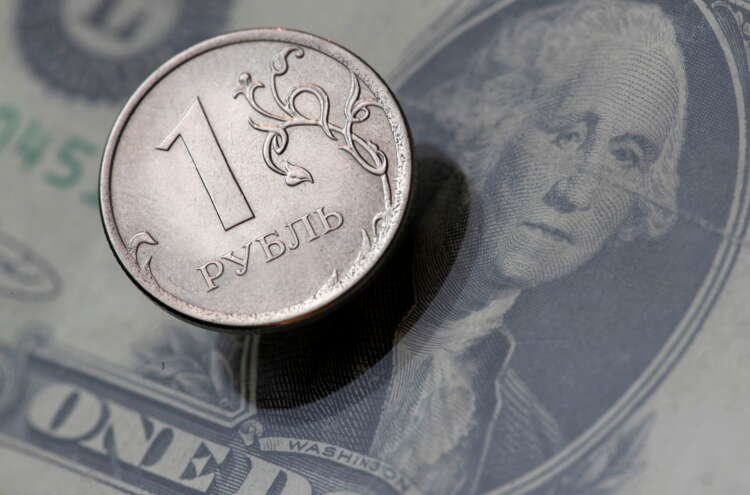Explainer-Russian banks face exclusion from London


By Tommy Wilkes and John McCrank
LONDON/NEW YORK (Reuters) – Russian banks will be “totally” excluded from Britain’s financial system, Prime Minister Boris Johnson said on Thursday, as the UK unveiled the first set of tougher Western sanctions following Russia’s invasion of Ukraine.
The measures target Russian banks, including the biggest, as well as members of the Russian elite, and are far more extensive than an earlier set announced.
The United States, the European Union and their allies are now expected to follow suit — and banks will be among the main targets as the West makes it tough for Russian lenders to operate internationally.
Shares in Russia’s biggest banks lost nearly half their value on Thursday.
Here is a rundown of how sanctions announced impact banks and investors and which potential new measures might hit harder:
WHAT HAS BEEN ANNOUNCED SO FAR?
The British government said it would impose an asset freeze on all major Russian banks, including state-owned VTB, its second-biggest bank, and stop major Russian companies from raising finance in Britain.
Russian banks would be cut off from sterling markets and clearing payments, and the United States is taking similar action on the dollar, Johnson said.
Britain also announced asset freezes and travel bans on members of Russia’s political and financial elite — including those who have long enjoyed high-rolling lifestyles in London.
More than 100 individuals, entities and subsidiaries will ultimately be sanctioned, the government said.
Britain had earlier imposed sanctions on just three billionaires with close links to Russian President Vladimir Putin and five relatively small lenders.
European foreign ministers earlier in the week agreed to sanction 27 individuals and entities, including banks financing Russian decision-makers and operations in the breakaway territories in Ukraine, but not the biggest lenders.
Washington had imposed sanctions on Promsvyazbank and VEB bank.
The United States had also ramped up prohibitions on Russian sovereign debt, which U.S. President Joe Biden said would cut the Russian government off from Western financing.
WHAT MIGHT COME NEXT?
Russia’s large banks are deeply integrated into the global financial system, meaning any sanctions on the biggest institutions could be felt far beyond its borders.
The sanctions announced earlier this week focused on smaller banks and were not as extensive as those imposed after Russia’s annexation of Crimea in 2014, although many of those remain in place.
But with Britain seeking to lock out all Russian lenders from operating in London, the U.S. and Europe are expected to follow with tough measures too.
President Biden said on Thursday after the latest Russian action that G7 leaders and U.S. allies would impose severe sanctions.
A senior U.S. administration official told reporters earlier this week that Russia’s state-backed Sberbank and VTB would face American sanctions if Moscow proceeded with its invasion of Ukraine.
Shares in those banks lost 40% of their value as investors dumped Russian assets.
Sberbank, Russia’s largest bank, said that it was prepared for any developments.
Washington has also prepared measures including barring U.S. financial institutions from processing transactions for Russian banks by cutting “correspondent” banking relationships, sources told Reuters last week.
Disabling international payments would hit hard and it is not clear whether officials will deploy that yet.
The new sanctions European Union leaders are preparing include freezing Russia’s assets, halting its banks’ access to financial markets and targeting “Kremlin interests”.
WHAT WOULD HIT HARDEST?
What banks and Western creditors fear most is that Russia is banned from the global payment system, SWIFT, which is used by more than 11,000 financial institutions in over 200 countries.
Such a move would hit Russian banks hard but the consequences are complex. Banning SWIFT would make it tough for European creditors to get their money back.
Britain’s Johnson said he intended to work with allies to shut off Russia’s access to SWIFT.
But several EU sources earlier on Thursday said that locking Russia out of SWIFT was unlikely to be agreed at this stage.
Analysts said Russian institutions are better able to cope with sanctions than eight years earlier, although that does not mean they would not hurt.
Russian state banks have cut their exposure to Western markets and since 2014 Russia has diversified away from U.S. Treasuries and dollars.
The euro and gold account for a bigger share of Russia’s reserves than do dollars, based on a January report from the Institute of International Finance.
Russia has other defences, including hard currency reserves of $635 billion, oil prices above $100 a barrel and low debt.
But Russia is vulnerable to capital flight — the central bank said it would intervene to help the rouble after investors sent it crashing to record lows.
WHICH FOREIGN BANKS ARE MOST EXPOSED?
There were big falls in shares of European banks on Thursday, with an index of European banking stocks closing down 8.1%.
Banks with significant operations in Russia were particularly hard hit, with Austria’s Raiffeisen Bank International down 23% and France’s Societe Generale losing 12%.
Italian and French banks each had outstanding claims of some $25 billion on Russia in the third quarter of 2021, based on Bank of International Settlement figures.
Austrian banks had $17.5 billion. That compares with $14.7 billion for the United States.
Graphic: Bank exposures to Russia- https://fingfx.thomsonreuters.com/gfx/mkt/myvmnxmabpr/banks%20russia.PNG
Many foreign banks have significantly reduced their exposure to Russia since 2014.
(Additional reporting by Tom Sims in Frankfurt, Iain Withers and Karin Strohecker in London, Michelle Price in Washington and John McCrank and Megan Davies in New York; Editing by Jane Merriman and John O’Donnell)
Explore more articles in the Top Stories category











